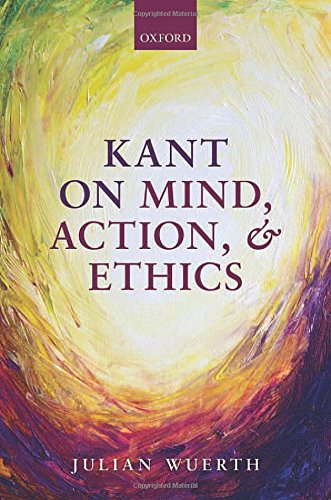(Ebook) Kant on Mind, Action, and Ethics by Julian Wuerth ISBN 9780199587629, 0199587620
In this book Julian Wuerth offers a radically new interpretation of Kants theories of mind, action, and ethics.
As the author of a Copernican revolution in philosophy, Kant grounded his philosophy in his positive theory of the mind, which remains an enigma two centuries later. Wuerths original interpretation of Kants theory of mind consults a far wider range of Kants recorded thought than previous interpretations, revealing a fascinating evolution in Kants thought in the decades before and after his 1781 Critique. Starting in the 1760s, Kant recognized the unique status of our epistemic contact to ourselves. This is the sole instance of our immediate epistemic contact with a substance, of being a substance, and it is the sole instance of epistemic contact with something other than the particular states of inner sense. Contrary to empiricists, Kant thus rejects the reduction of the self to a bundle of mental states of inner sense. But Kant also rejects the rational psychologists assumption that the souls substantiality and simplicity implies its permanence, incorruptibility, and immortality. As Kant developed his transcendental idealism, he eventually pinpointed the source of their errors, a source neither unique to a particular, historical school, nor random. It is instead a deep, natural, and timeless transcendental confusion. Kants new account of substance allows him to draw new distinctions in kind between sensibility and understanding and between phenomenal and noumenal substance, setting the stage for a transcendental argument that only at the phenomenal level do substantiality and simplicity imply permanence and incorruptibility.
Wuerth next undertakes a groundbreaking study of Kants theory of action and ethics. He first maps Kants notoriously vast and complex system of the minds powers, drawing on all of Kants recorded thought. This system structures Kants philosophy as a whole and so provides crucial insights into this whole and its parts, including Kants theory of action, a persisting stumbling block for interpreters of Kants ethics. Wuerth demonstrates that Kant rejects intellectualist theories of action that reduce practical agents to pure reason. We are instead irreducibly both intellectual and sensible, exercising a power of choice, or Willkür, subject to two irreducible conative currencies, moral motives and sensible incentives, as Kant makes clear long before his 1785 Groundwork. Immoral choices at odds with the former can thus nonetheless be coherent choices in harmony with the latter. Wuerth applies these new findings about Kants theory of mind and action to an analysis of the foundations of Kants ethics. He rejects the dominant constructivist interpretation in favor of a moral realist one. At the heart of Kants Enlightenment ethics is his insistence that the authority of the moral law ultimately rests in our recognition of its authority. Kant guides us to this recognition of the authority of the moral law, across his works in ethics and his various formulations of the moral law, using a single elimination of sensibility procedure. Here Kant systematically rejects the pretenses of sensibility to isolate reason and its insights into moral right and wrong. Precisely because immoral choice remains a coherent alternative, however, moral virtue demands our ongoing cultivation of our capacities for cognition, feeling, desire, and character.
*Free conversion of into popular formats such as PDF, DOCX, DOC, AZW, EPUB, and MOBI after payment.


